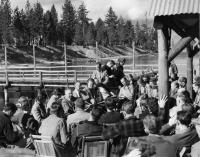Hofmeyr, who found such treatment particularly painful, told me why he thought Buchman sometimes handled close friends so roughly. 'He was concerned with training two hundred people. All got the impact, all learnt the lesson. When he was sailing into anyone, you felt it could justly be you.'
But Buchman, now as always, was unpredictable. He shook with rage one day because a cook had once again produced tough meat. The next day he appeared at the kitchen door holding a tiny wild flower for her. “Here you are,' he said. 'This is "self-heal".'
Most of the lessons of those days were drawn out of simple things. Buchman inspected a cottage which was to be returned to its owner and found an obstinate rim round a bath. 'It was like that when we came,' protested the culprit.

'Always leave things better than you find them,' Buchman replied and got down on his knees and cleaned the bath himself.
In fact, quite apart from spiritual needs, the team with him - many of them university men and women, 'ladies' who had done little housework for themselves and men who had done none - needed a full course in housekeeping and economy. A lorry went down to the towns to buy in the cheapest markets, and every cent was guarded.
The end result of the time at Tahoe, according to Reginald Hale, was 'a force-in-being, like a regular army, capable of fighting anywhere any time'. 'Most of us', he explains, 'had experienced God's power to change our lives. But at Tahoe we had a corporate experience of Christ. Together we accepted the finality of His victory on the Cross to break the power of evil in our lives and in the world. As we became irrevocably committed to Him, we found our petty divisions of nationality, class, language and points of view just dropped off. Committed to Him, we were committed to each other also.'16
Workers from West Coast war industries would drive all night to spend a day with Buchman and his friends at Tahoe. Among them was John Riffe, a 250-pound steelworkers' leader from San Francisco, whom his union president called 'the roughest, toughest man in the steelworkers'. Buchman had first met him at a weekend round-table in June, a month before going to Tahoe. On that occasion Riffe had argued hotly with Buchman that he had no need of change. 'That's fine,' Buchman had replied. 'Maybe there's someone else you'd like to see different.' Several names had immediately leapt into Riffe's mind, including a steel industrialist with whom negotiations had broken down, colleagues in his own union, and his wife, Rose. 'That's the point,' Buchman had added, 'to learn to change your enemies and make them into friends.' They had spent the rest of the evening together, and Riffe had gone to bed with the final thought that if he listened to God he could find out how to make people different.
295
Photo: In spite of the public demand, Buchman withdrew to Tahoe in the Sierra Nevada mountains in September, 1940, with close colleagues, to seek the next moves and find a deeper commitment.
©Arthur Strong/MRA Productions